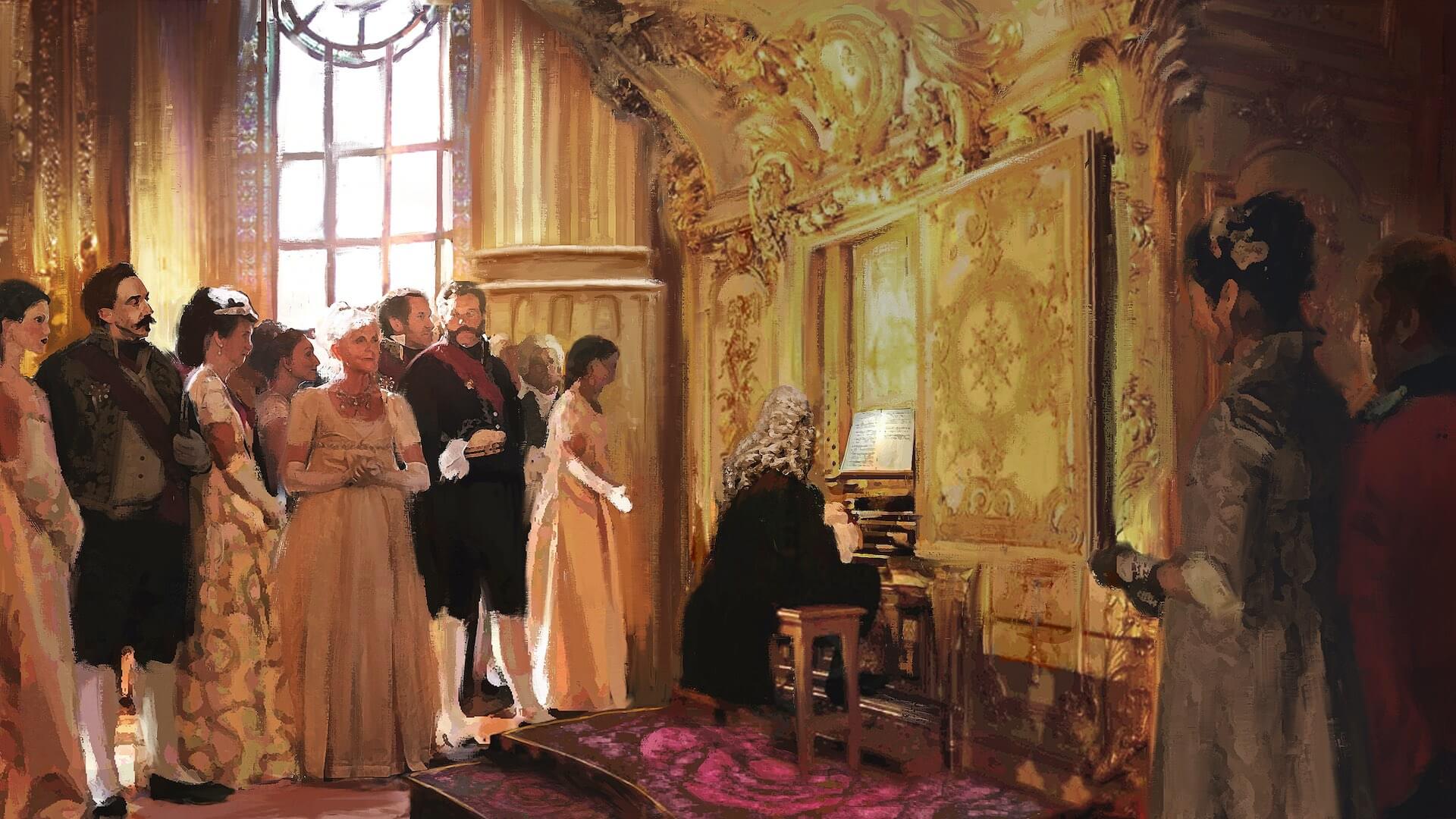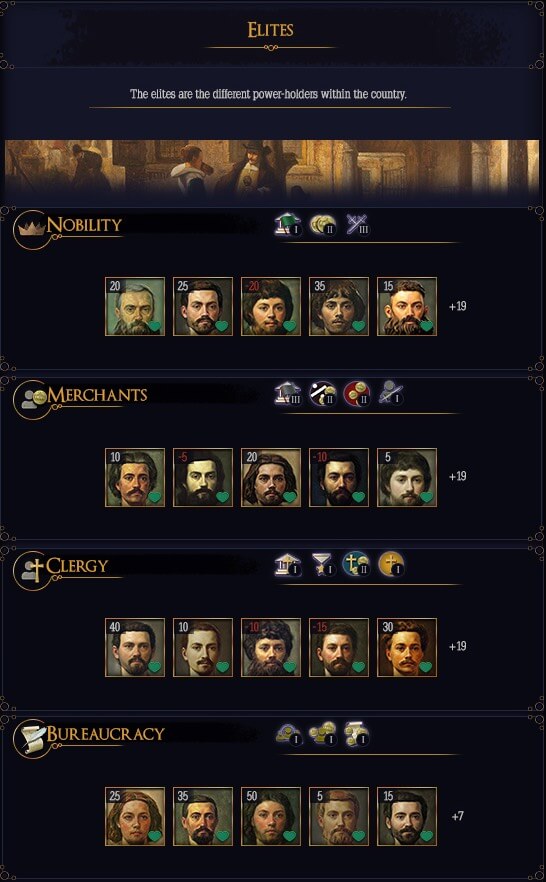Dev Diary #10: Elites
16:21, 4 Jun 2022

Hello and welcome to the 10th development diary of Grey Eminence!
Today, we’ll be taking a look at elites, the power-holders of society. Every country contains multiple elites, groups of characters with common socio-economic roles. While characters have their own individual personalities and goals, their collective behavior exerts a strong influence on their country’s stability and power: loyal elites can be leveraged to assist your plans, while disloyal elites can become dangerous saboteurs.
Elites
Let’s start by defining how an elite is structured. An elite’s existence, rights, and obligations are defined by their country’s laws. These laws apply only to tiles the country owns directly, so the tiles of subject countries might have other elites if their laws differ from those of their overlord.
As long as a country’s laws dictate that a given elite should exist, a fixed number of elite positions are created in every province of that country. At the start of the game, these positions are all occupied by existing characters - as many as we’ve been able to historically verify, with the rest being procedurally generated. These positions come with ownership of specific buildings (and thus usually carry significant incomes) and have specific rules for succession - which are usually also determined by country laws.
To give you an example: in the province of Brittany, there might be 4 elite positions for nobles. Effectively, this means that we model the 4 most powerful noble characters (and their families). These characters don’t own the buildings directly - the ownership is tied to the position itself - so holdings don’t get diluted or lost upon succession. Crucially, the same character can fill multiple positions (in different elites). So, for example, a particularly successful merchant might petition you for a noble title: granting it would win you a powerful ally, yet it would also anger those who believe nobility is a birthright.
Elite characters can use the resources of their positions to further their own goals: securing more favorable rights, lowering their obligations, expanding their existing holdings, or even attempting to carve out their own vassal country out of the province they reside in. Elites can also be interacted with by hostile powers: for example, another country can attempt to contact them via espionage to bribe them over in an upcoming conflict.
So, let’s do an overview of all the elites that exist in Grey Eminence: the nobility, the merchants, the clergy, the tribes, the bureaucracy, and the military.
The nobility are the hereditary landowners of the realm. In 1356, they are the most powerful elite in most countries by a wide margin. Nobles tend to invest in rural buildings, owe feudal dues and can raise levies (which can partially be utilized by the country itself).
The merchants are the engine of urban life, responsible for handling trade. They tend to invest in urban buildings, pay taxes and tariffs, and can muster militias - which, again, can be made disposable to the state.
The clergy are the representatives of the country’s primary religion. Depending on the country’s investiture law, clergy positions can be assigned by a head of faith, the state or independently by local elites/populations. The clergy too can be assessed taxes and can maintain militant clerical orders.
The tribes represent those social groups bound by kinship. They can be given varying degrees of autonomy, be made to pay tribute or to participate in military campaigns.
The bureaucracy represents the state. For most countries in 1356, the bureaucrats are synonymous with one of the other elites. In other words, the bureaucracy starts as an elite beholden to others. The country’s methods of recruitment can be reformed to create an independent bureaucracy, though that is far from easy. The bureaucrats can be paid varying wages (which significantly impacts their loyalty and propensity for corruption) and can be forced to extract taxation in different ways.
The military elite is comprised of the top generals and admirals of the country’s army and navy. Like the bureaucracy, the military usually starts off as an elite captured by another - most commonly the nobles - but it too can be reformed into an independent elite with its own goals and priorities. There are various laws which configure the composition of the military elite, but we’ll explore those in more detail in the series of dev diaries on war.
Each elite character can be interacted with individually - for example, to raise a particular noble's levies or to extract a greater tax from a particular merchant or en masse - and will gain or lose favors accordingly. Favors are a decaying currency, which can be spent to enforce a certain action or to extract a certain concession from an elite character. They can be accumulated by either side: and elites will push whatever advantage they feel they are owed mercilessly (within the confines of their personality, of course).
Favors have an important impact on character attitudes (which, in turn, significantly impact character behavior). A character that is owed favors will increasingly turn hostile if they’re denied the opportunity to use those favors. In other words, leveraging elites by promising them future benefits might be a huge short-term gain for your country’s power, but can easily harm you in the long run.
Hostile elites can become a nuisance in two major ways. Firstly, they can form factions with various demands: from simple requests like lower taxes to major revamps of the country’s laws and structure. Factions are a pretty big topic - they’re the precursors to rebellions and revolutions - so we’ll cover them in a separate dev diary.
Another way in which elite characters can hinder your plans is by directly collaborating with your enemies. Foreign countries can infiltrate your realm through the espionage system (which, surprise, will be the topic of another dev diary), which allows them to collaborate with your elites. And in cases where a certain elite character feels so scornfully insulted, they can reach out to your enemies on their own. Traitorous elites are a very real danger to most countries, especially those with devolved militaries which are run by the very same elites. In other words, ensuring elite loyalty is a key contributor to long-term success.

An early look at the UI for elites. It conveniently lets you observe the strongest characters in each elite - with the possibility of expanding the panel to show all members of an elite - and has shortcut buttons for all the relevant laws for that elite.
Moddability
Like all our other systems, elites can be modded significantly - though unlike most others, there’s a bit of an added difficulty in doing so. Content-level changes can, of course, be made via the world editor as always, yet system-level changes are slightly more difficult than usual due to the interconnectedness of the elite system to most other parts of Grey Eminence. From a technical standpoint, elites are the connecting layer between the economy and characters without which the game wouldn’t be nearly as performant (since having individual non-elite characters owning buildings and spending money would burn a huge amount of our performance budget). Thus, tampering with the elite system requires either also disabling character ownership entirely or making precise redirections towards the other systems depending on what you’re hijacking the elites for.
That’s all this time around! Keep an eye out for the next dev diary on June 18, and until then make sure you’ve joined our Discord and Subreddit, and follow us on YouTube, Facebook, and Twitter. Thanks for reading!


 Back
Back